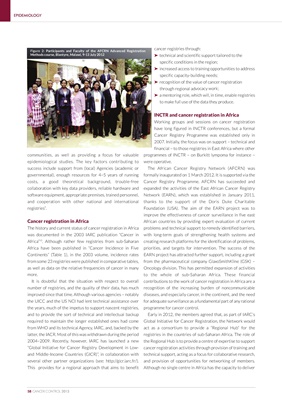
EPIDEMIOLOGY
Figure 2: Participants and Faculty of the AFCRN Advanced Registration
cancer registries through:
Methods course, Blantyre, Malawi, 9-13 July 2012 ‰ technical and scientific support tailored to the
specific conditions in the region;
‰ increased access to training opportunities to address
specific capacity-building needs;
‰ recognition of the value of cancer registration
through regional advocacy work;
‰ a mentoring role, which will, in time, enable registries
to make full use of the data they produce.
INCTR and cancer registration in Africa
Working groups and sessions on cancer registration
have long figured in INCTR conferences, but a formal
Cancer Registry Programme was established only in
2007. Initially, the focus was on support – technical and
financial – to those registries in East Africa where other
communities, as well as providing a focus for valuable programmes of INCTR – on Burkitt lympoma for instance –
epidemiological studies. The key factors contributing to were operative.
success include support from (local) Agencies (academic or The African Cancer Registry Network (AFCRN) was
governmental), enough resources for 4–5 years of running formally inaugurated on 1 March 2012. It is supported via the
costs, a good theoretical background, trouble-free Cancer Registry Programme. AFCRN has succeeded and
collaboration with key data providers, reliable hardware and expanded the activities of the East African Cancer Registry
software equipment, appropriate premises, trained personnel, Network (EARN), which was established in January 2011,
and cooperation with other national and international thanks to the support of the Doris Duke Charitable
registries9. Foundation (USA). The aim of the EARN project was to
improve the effectiveness of cancer surveillance in five east
Cancer registration in Africa African countries by providing expert evaluation of current
The history and current status of cancer registration in Africa problems and technical support to remedy identified barriers,
was documented in the 2003 IARC publication “Cancer in with long-term goals of strengthening health systems and
10
Africa” . Although rather few registries from sub-Saharan creating research platforms for the identification of problems,
Africa have been published in “Cancer Incidence in Five priorities, and targets for intervention. The success of the
Continents” (Table 1), in the 2003 volume, incidence rates EARN project has attracted further support, including a grant
from some 23 registries were published in comparative tables, from the pharmaceutical company GlaxoSmithKline (GSK) –
as well as data on the relative frequencies of cancer in many Oncology division. This has permitted expansion of activities
more. to the whole of sub-Saharan Africa. These financial
It is doubtful that the situation with respect to overall contributions to the work of cancer registration in Africa are a
number of registries, and the quality of their data, has much recognition of the increasing burden of noncommunicable
improved since that time. Although various agencies – notably diseases, and especially cancer, in the continent, and the need
the UICC and the US NCI had lent technical assistance over for adequate surveillance as a fundamental part of any rational
the years, much of the impetus to support nascent registries, programme for cancer control.
and to provide the sort of technical and intellectual backup Early in 2012, the members agreed that, as part of IARC’s
required to maintain the longer established ones had come Global Initiative for Cancer Registration, the Network would
from WHO and its technical Agency, IARC, and, backed by the act as a consortium to provide a “Regional Hub” for the
latter, the IACR. Most of this was withdrawn during the period registries in the countries of sub-Saharan Africa. The role of
2004–2009. Recently, however, IARC has launched a new the Regional Hub is to provide a centre of expertise to support
“Global Initiative for Cancer Registry Development in Low- cancer registration activities through provision of training and
and Middle-Income Countries (GICR)”, in collaboration with technical support, acting as a focus for collaborative research,
several other partner organizations (see: http://gicr.iarc.fr/). and provision of opportunities for networking of members.
This provides for a regional approach that aims to benefit Although no single centre in Africa has the capacity to deliver
58 CANCER CONTROL 2013